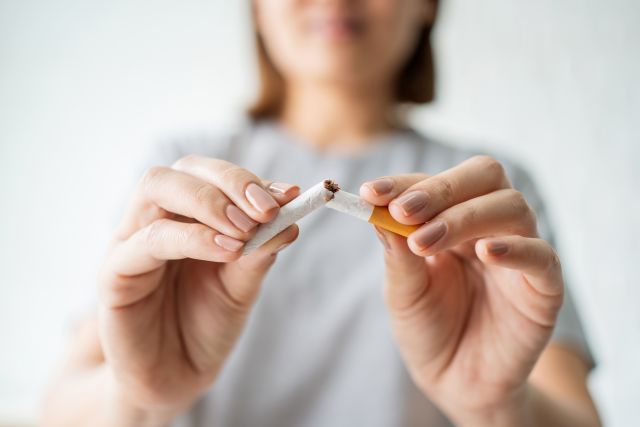Updated on March 29, 2024.
Among the lists of breast cancer risk factors published by major health organizations, it may come as a surprise that smoking doesn't appear in these lists. A risk factor is something that increase your risk for a certain disease.
- The American Cancer Society (ACS) doesn’t list tobacco use among lifestyle risk factors, instead placing it on a list of factors with “unclear” effects on breast cancer risk.
- The Centers for Disease Control and Prevention (CDC) mentions that smoking “may” increase this risk. It’s listed behind other lifestyle habits with a more certain effect, such as being physically inactive and drinking alcohol.
- The National Cancer Institute says that cigarette smoking and exposure to secondhand smoke “have little or no effect on the risk of breast cancer.”
That said, some prominent groups do recognize a connection. The World Health Organization (WHO), for example, states unequivocally that “certain factors increase the risk of breast cancer” and lists tobacco use among these.
Evidence for a connection between smoking and breast cancer
Despite the lack of a general consensus, evidence continues to build supporting a connection between smoking and increased risk for breast cancer. For example:
- One study published in 2019 in the International Journal of Epidemiology found that women who smoked had a significantly higher risk of breast cancer, across five racial and ethnic groups. It was especially true for people who started smoking younger (especially as teenagers), smoked more daily, smoked for a longer duration of time, and who smoked more than five years before giving birth to their first child.
- A review of 214 studies published in 2020 in the Asian Pacific Journal of Cancer Prevention found that exposure to tobacco smoke was linked to a higher risk of breast cancer in women in Asia.
- Another study published in the British Journal of Cancer in 2021 looked at over 100,000 cases of invasive breast cancer (cancer that starts in one part and spreads to other parts of the breast) and found evidence to support long-term smoking as a risk factor, even for those who had quit.
Smoking may also make an already-established cancer even worse. A 2021 study published in Nature Communications found a clear link between nicotine—the main addictive ingredient in cigarettes—and breast cancer tumors spreading to the lungs.
How to quit tobacco
Smoking is considered to be a major risk factor for many diseases aside from breast cancer, including heart disease, stroke, chronic obstructive pulmonary disease (COPD, a chronic disease that permanently damages the lungs), and lung cancer. By quitting tobacco, you can lower your odds of developing these conditions—often significantly.
While different quit strategies work for different people, the following tips may be effective:
Find your reason for quitting. Telling yourself you “shouldn’t” smoke may not provide the motivation you need. Your reasoning reflects what’s most important to you—and can include:
- Living a healthier lifestyle
- Having more energy
- Saving money
- Setting a good example or being there for your family
Create a plan. Preparing a quit plan will help you anticipate issues and come up with solutions. To build a successful quit plan:
- Pick a specific quit date.
- Tell loved ones—and let them know how they can help. Try making a support list including friends, family, phone numbers, and support groups.
- Get rid of reminders including ashtrays, lighters, and even the smell of smoke in your car, clothes, and furniture.
- Figure out what your triggers are. Which activities, situations, or people are often linked to cravings for a cigarette? Think about ways to deal with these factors.
- Assemble a toolkit to help with withdrawal. It may include quit-smoking medications, distractions when you feel a craving, and safe substitutes for cigarettes like gum or drinking water.
- Plan rewards for when you meet goals.
While more research is needed to fully understand the link between smoking and breast cancer, quitting will lower your risk of getting many other types of cancers and health conditions. And you may even reverse your risk—20 years after quitting, your risk for many cancers drops to nearly the same as someone who has never smoked.






